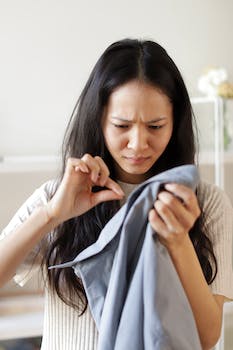

-
Table of Contents
"Clear the way, hear the day - Say goodbye to water trapped in your ears!"
Introduction
Water trapped in the ears can be a common and uncomfortable problem that many people experience. Whether it's from swimming, bathing, or even showering, water can sometimes get trapped in the ear canal, causing a sensation of fullness, muffled hearing, and even discomfort or pain. In this article, we will explore various methods and techniques to effectively deal with water trapped in the ears, providing relief and restoring normal hearing.
Effective Home Remedies for Removing Water Trapped in the Ears
Dealing with Water Trapped in the Ears
Water trapped in the ears can be an uncomfortable and annoying sensation. Whether it's from swimming, showering, or even just getting caught in the rain, having water stuck in your ears can cause temporary hearing loss, discomfort, and even lead to infections if not properly addressed. Fortunately, there are several effective home remedies that can help remove water from the ears and provide relief.
One of the simplest and most commonly used methods to remove water from the ears is the gravity technique. This involves tilting your head to the affected side and gently pulling on your earlobe to create a slight vacuum. By doing this, you allow the water to drain out naturally. It's important to avoid inserting any objects into your ear canal, as this can push the water further in and potentially cause damage.
Another effective home remedy is the Valsalva maneuver. This technique involves closing your mouth, pinching your nose shut, and gently blowing air out through your nose. This action helps to equalize the pressure in your ears and can force the water out. It's important to blow gently and not forcefully, as excessive pressure can cause damage to your eardrums.
If the water remains stubbornly trapped, you can try using heat to encourage evaporation. Applying a warm compress or using a blow dryer on a low setting can help to evaporate the water and provide relief. It's important to ensure that the heat is not too high, as this can cause burns or damage to your ears.
For those who prefer natural remedies, a mixture of rubbing alcohol and white vinegar can be effective in removing water from the ears. This solution helps to break down the water and evaporate it more quickly. Simply mix equal parts of rubbing alcohol and white vinegar, tilt your head to the affected side, and use a dropper to apply a few drops into your ear. Allow the mixture to sit for a few minutes before tilting your head back to allow the water to drain out.
If none of these home remedies provide relief, it may be necessary to seek medical attention. A healthcare professional can use specialized tools and techniques to remove the water safely and effectively. They may also be able to determine if there is an underlying issue, such as an infection, that needs to be addressed.
In conclusion, having water trapped in the ears can be a bothersome experience. However, there are several effective home remedies that can help remove the water and provide relief. From the gravity technique to the Valsalva maneuver, applying heat, or using a mixture of rubbing alcohol and white vinegar, there are options to suit different preferences. It's important to remember to avoid inserting any objects into the ear canal and to seek medical attention if the water remains trapped or if there are signs of infection. By following these remedies and taking proper care of your ears, you can effectively deal with water trapped in the ears and prevent further discomfort or complications.
How to Prevent Water from Getting Trapped in the Ears

Water trapped in the ears can be a frustrating and uncomfortable experience. Whether it's from swimming, showering, or even just getting caught in the rain, water can easily find its way into the ear canal and become trapped. This can lead to a feeling of fullness, muffled hearing, and even pain. Fortunately, there are several steps you can take to prevent water from getting trapped in your ears.
One of the most effective ways to prevent water from getting trapped in the ears is to use earplugs or a swim cap. These can create a barrier between the water and your ear canal, preventing it from entering and becoming trapped. There are many different types of earplugs available, including foam, silicone, and wax. It's important to find the type that works best for you and provides a tight seal.
Another preventative measure is to tilt your head to the side and gently pull on your earlobe after swimming or showering. This can help to drain any water that may have entered the ear canal. It's important to be gentle when doing this, as excessive pulling or tugging can cause damage to the delicate structures of the ear.
Additionally, it's important to avoid inserting any objects into the ear canal in an attempt to remove trapped water. This includes cotton swabs, bobby pins, or any other small objects. Not only can this push the water further into the ear canal, but it can also cause injury or damage to the ear. Instead, try using gravity to your advantage by tilting your head to the side and allowing the water to naturally drain out.
If you frequently experience water trapped in your ears, it may be helpful to use a few drops of a drying solution after swimming or showering. These solutions, which can be purchased over-the-counter at most pharmacies, help to evaporate any remaining water in the ear canal. It's important to follow the instructions on the packaging and only use the recommended amount of drops.
In some cases, water trapped in the ears can lead to an infection known as swimmer's ear. This occurs when bacteria or fungi grow in the moist environment of the ear canal. Symptoms of swimmer's ear can include itching, redness, pain, and discharge. If you suspect you have swimmer's ear, it's important to seek medical attention. Your doctor can prescribe medication to treat the infection and provide guidance on how to prevent future occurrences.
In conclusion, water trapped in the ears can be a bothersome issue, but there are steps you can take to prevent it. Using earplugs or a swim cap, tilting your head to drain water, and avoiding the use of objects in the ear canal are all effective preventative measures. If you frequently experience water trapped in your ears or develop symptoms of swimmer's ear, it's important to seek medical attention. By taking these steps, you can keep your ears dry and avoid the discomfort of trapped water.
Medical Treatments for Water Trapped in the Ears
Dealing with Water Trapped in the Ears
Water trapped in the ears can be an uncomfortable and annoying problem. Whether it's from swimming, showering, or any other water-related activity, the sensation of water in the ears can be bothersome and even lead to temporary hearing loss. Fortunately, there are several medical treatments available to help alleviate this issue.
One common method used to remove water from the ears is the use of ear drops. These drops are specifically designed to help dry out the ear canal and remove any trapped water. They typically contain a mixture of alcohol and acetic acid, which helps to evaporate the water and prevent any potential infections. To use ear drops, simply tilt your head to the side and place a few drops into the affected ear. Allow the drops to sit for a few minutes before tilting your head in the opposite direction to let the excess liquid drain out.
Another effective treatment for water trapped in the ears is the use of a warm compress. This method works by applying heat to the affected ear, which helps to evaporate the water and relieve any discomfort. To create a warm compress, soak a clean washcloth in warm water and wring out the excess liquid. Then, hold the compress against the affected ear for a few minutes, making sure not to apply too much pressure. Repeat this process several times until the water has evaporated and the discomfort has subsided.
In some cases, a technique called the Valsalva maneuver can be used to remove water from the ears. This method involves closing your mouth, pinching your nose shut, and gently blowing air out through your nose. The pressure created by this maneuver can help to force the water out of the ear canal. However, it's important to be cautious when using this technique, as blowing too forcefully can cause damage to the eardrum. It's best to start with a gentle blow and gradually increase the pressure if necessary.
If these medical treatments do not provide relief, it may be necessary to seek professional help. An ear, nose, and throat specialist, also known as an otolaryngologist, can examine your ears and determine the best course of action. They may use specialized tools, such as an otoscope, to visualize the ear canal and remove any trapped water or debris. In more severe cases, they may recommend a procedure called ear irrigation, which involves flushing the ear canal with a gentle stream of water to remove the trapped fluid.
In conclusion, dealing with water trapped in the ears can be a frustrating experience. However, there are several medical treatments available to help alleviate this issue. Ear drops, warm compresses, and the Valsalva maneuver can all be effective in removing water from the ears. If these methods do not provide relief, it's important to seek professional help from an otolaryngologist. With the right treatment, you can quickly and safely get rid of that pesky water and restore your comfort and hearing.
Q&A
1. How can I get water out of my ears?
Tilt your head to the side and gently pull on your earlobe to straighten the ear canal. Then, hop on one foot or tilt your head to the side to encourage the water to drain out.
2. Is it safe to use cotton swabs to remove water from the ears?
No, using cotton swabs can push the water further into the ear canal and potentially cause damage. It is best to avoid using cotton swabs for this purpose.
3. What are some home remedies to help remove water from the ears?
Some home remedies include using a blow dryer on a low setting, using a mixture of equal parts rubbing alcohol and white vinegar, or using over-the-counter ear drops specifically designed to dry out the ears.
Conclusion
In conclusion, water trapped in the ears can be a common and uncomfortable problem. It is important to address this issue promptly to prevent any potential complications. Various home remedies, such as tilting the head, using gravity, or applying heat, can help remove the water. If the problem persists or is accompanied by pain or hearing loss, it is advisable to seek medical attention.












